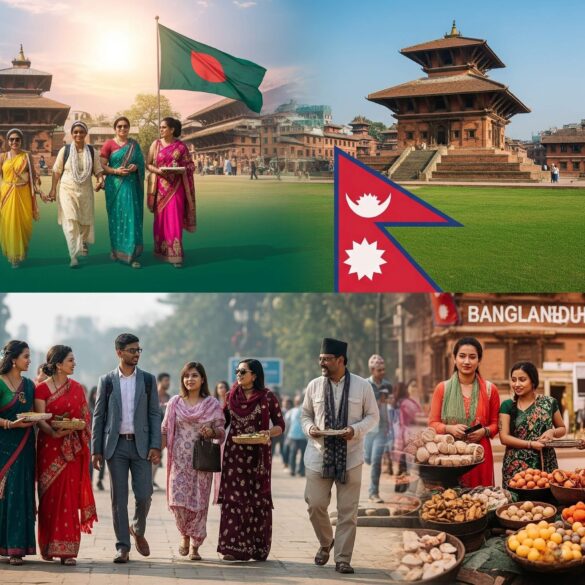Bangladesh and Nepal recently came together in Dhaka to celebrate more than just travel—they honoured a shared history and culture that connects both nations. In a special event titled Neighbourly Nepal: Land of Lifetime Experiences, officials, travel experts, and cultural ambassadors discussed how tourism can be a bridge between people, not just a source of income. The gatherings underscored the deep historical links between Bangladesh and Nepal. Centuries ago, scholars from present-day Bangladesh traveled to Nepal to study and teach Buddhism. This shared spiritual heritage still shapes values, festivals, and languages across generations today . The cultural DNA is similar, from celebrating religious festivals to practising warm, welcoming hospitality. In this context, tourism becomes an opportunity to revive connections. During the event, ideas were presented for developing tourism routes that connect Bangladesh and Nepal. These routes would feature cultural paths, opportunities to enjoy local cuisine, celebrations, and student exchange programs.The goal is to invite visitors to explore shared history—from Buddhist monasteries to folk traditions—and create lasting memories that go beyond sightseeing . The numbers reflect growing interest. In 2023, more than 36,000 Bangladeshis visited Nepal, a significant rise from pre-pandemic levels. Direct flights between Kathmandu and Dhaka now number thirteen per week, easing travel options and reinforcing bonds between families, students, and friends. Another promising sign is the nearly 2,700 Nepali students studying at Bangladeshi universities. These young people forge deep cultural ties, experiencing life, education, and traditions together. Speakers at the event emphasized that tourism’s value lies in bringing people together. A mountaineer from Bangladesh shared his “Sea to Summit” story after climbing Everest, and Nepali folk artists performed songs that celebrated spiritual connections and friendship. Tourism professionals also stressed B2B cooperation between travel companies to design joint packages that showcase the diversity and unity of South Asia. Officials underlined the role of mindful planning. By promoting lesser-known destinations, rural community engagement, and home-stay options, both countries can offer more authentic experiences. They encouraged entrepreneurs to include cultural performances, traditional crafts, wellness retreats, and medical tourism in their offerings, ensuring benefits reach small towns and communities. This approach reflects a new idea: tourism as cultural diplomacy. When visitors cross borders, share meals, and celebrate common festivals like Dashain or Pahela Baisakh, they build respect and friendship. Tourism becomes a way to remember shared pasts and imagine shared futures, not just a business. By focusing on people-to-people connections, Bangladesh and Nepal are embracing tourism as a shared heritage. Their voices call for nature lovers, history buffs, students, and families to travel together—building stories that connect two lands united by culture and goodwill. In doing so, tourism becomes a heartfelt celebration of what binds nations beyond maps and economies.
Tourism Not Just an Economic Activity but a Shared Heritage Between Bangladesh, Nepal
53


